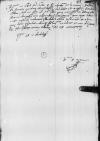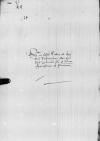Reverendissimae Dominationi Vestrae deditissimus Ioannes Dantiscus (Johannes von Höfen, Ioannes de Curiis, Jan Dantyszek, Johannes Flachsbinder) (*1485 – †1548), eminent diplomat and humanist in the service of the Jagiellons, neo-Latin poet; 1530-1537 Bishop of Kulm; 1537-1548 Bishop of Ermland⌊IoannesIoannes Dantiscus (Johannes von Höfen, Ioannes de Curiis, Jan Dantyszek, Johannes Flachsbinder) (*1485 – †1548), eminent diplomat and humanist in the service of the Jagiellons, neo-Latin poet; 1530-1537 Bishop of Kulm; 1537-1548 Bishop of Ermland⌋ episcopus Varmiensis scripsit
Postscript:
 BCz, 245, p. 84
BCz, 245, p. 84
Novissime Dominationi Vestrae Reverendissimae scripsi canonicatum Gutstatensem me Chaplain to Ioannes DANTISCUS ⌊sacellanoChaplain to Ioannes DANTISCUS ⌋ meo contulisse. Interim vero edoctus sum, quod eiusmodi collationem suspendissem usque ad maturiorem deliberationem. Iussi itaque, ut Chaplain to Ioannes DANTISCUS ⌊sacellanusChaplain to Ioannes DANTISCUS ⌋ meus, qui proxime inservire mihi coepit, substinentiam habeat, quousque se iterum offerat occasio. Libenter igitur gratificabor Dominationi Vestrae Reverendissimae, ut Simon Hecht because of illness, he did not take the canonry of Guttstadt (Dobre Miasto) designated for him by Dantiscus in 1538, cf. Tiedemann Giese to Ioannes Dantiscus, Löbau (Lubawa), 1539-01-30 (CIDTC IDL 2065); parish priest in Dietrichswalde (Gietrzwałd); from 1547 Vicar of Ermland (Warmia) (KOPICZKO 2, p. 112)⌊parrochusSimon Hecht because of illness, he did not take the canonry of Guttstadt (Dobre Miasto) designated for him by Dantiscus in 1538, cf. Tiedemann Giese to Ioannes Dantiscus, Löbau (Lubawa), 1539-01-30 (CIDTC IDL 2065); parish priest in Dietrichswalde (Gietrzwałd); from 1547 Vicar of Ermland (Warmia) (KOPICZKO 2, p. 112)⌋ ex Dietrichswalde (Gietrzwałd), village SE of Allenstein (Olsztyn), roughly halfway between Löbau (Lubawa) and Heilsberg (Lidzbark Warmiński)⌊DittrichwaltDietrichswalde (Gietrzwałd), village SE of Allenstein (Olsztyn), roughly halfway between Löbau (Lubawa) and Heilsberg (Lidzbark Warmiński)⌋ in collegium meum transferatur. Qui cum ad me venerit, ad commendationem Dominationis Vestrae Reverendissimae non gravate eum superinscribed⌈eumeum superinscribed⌉ instituam, placere enim et gratum facere Dominationi Vestrae Reverendissimae cupio in omnibus.
Ioannes, tailor ⌊SartoremIoannes, tailor ⌋ ob quasdam operas hucusque hic retinui.
Ex Heilsberg (Lidzbark Warmiński, Heilsberga), town in Ermland (Warmia), the main seat of the bishops of Ermland⌊HeilsbergHeilsberg (Lidzbark Warmiński, Heilsberga), town in Ermland (Warmia), the main seat of the bishops of Ermland⌋, XVII Octobris etc.



 BCz, 245, p. 85
BCz, 245, p. 85